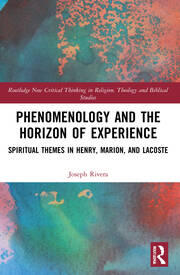Symposium Introduction
Panelists
Stephen Lewis
Martin Koci
Stephanie Rumpza
Brian Robinette
Andrew Prevot
Overview
This book explores the threshold between phenomenology and lived religion in dialogue with three French luminaries: Michel Henry, Jean-Luc Marion, and Jean-Yves Lacoste. Through close reading and critical analysis, each chapter touches on how a liturgical and ritual setting or a spiritual vision of the body can shape and ultimately structure the experience of an individual’s surrounding world. The volume advances debate about the scope and limits of the phenomenological analysis of religious themes and disturbs the assumption that theology and phenomenology are incapable of constructive interdisciplinary dialogue.
Reviews and Endorsements
“When Husserl borrowed William James’s notion of a horizon, he enabled phenomenology to give the richest account of experience that philosophy had yet known. Can this horizon be erased or disturbed? Some contemporary writing suggests so. For his part, Joseph Rivera points us to the implacable philosophical and theological need for a horizon as a way of orienting and deepening our experience of the world, one another, and God.” – Kevin Hart, The University of Virginia
“As a whole, Phenomenology and the Horizon of Experience enriches the reader’s understanding of phenomenology after the theological turn […]. Joseph Rivera navigates the tumultuous waters of the French debate by illuminating not only the theological or religious character of French phenomenology after the turn, but in fact its spiritual character as well. In this way, Rivera offers an original reflection on experience and phenomenality which, through the logic of the horizon, carries the theological metaphysics of the turn into discourse with the spiritual life of faith, culminating with a fascinating analysis of sacramentality as a practical ‘attitude’ towards human being in the world.” – James Lorenz in The Heythrop Journal
“At times, the author moves effortlessly from analytic philosophy to medieval theology through phenomenology and into literary prose all within one page. Yet this diversity and these methodological transitions do not distract from how this still is a serious work of phenomenology. While accessible and interdisciplinary, it is not merely another repetition of hermeneutic explanation of those great ‘fathers’ of the theological turn. It carefully assesses their work and develops its own original argument and novel concepts.” – Jason Alvis in Modern Theology


